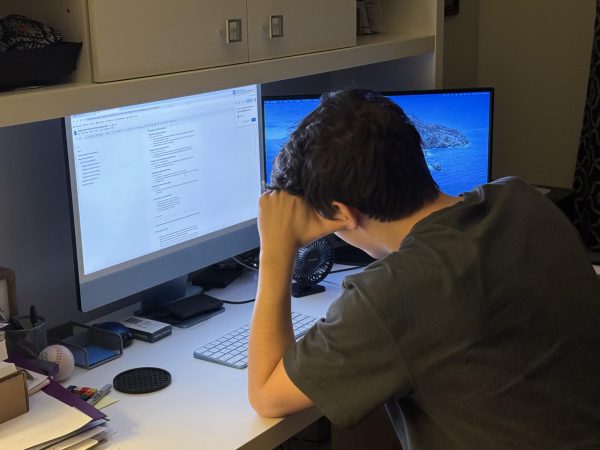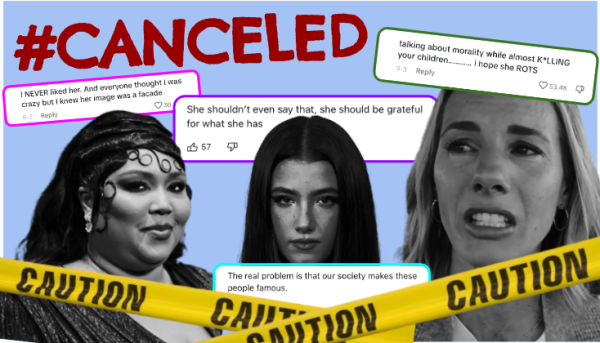Is the FCPS health curriculum encouraging disordered eating?
Tracking calories can lead to restrictive eating.
May 29, 2023
In today’s world, it seems eating disorders are becoming devastatingly common. Many blame this on the impact of social media, which is a contributing factor, but there are other places to direct blame as well.
At Linganore High School (LHS), the health curriculum features an extremely controversial nutrition unit. This unit includes both tracking weight and counting calories, two tasks with which many health students have expressed their discomfort.
In fact, both of these behaviors are an early, telltale sign of eating disorders and should not be encouraged in young people. According to John Hopkins, eating disorders are typically developed between the ages of 12 and 25. The main reason for this is because the brain does not finish developing until the age of 25.
Consequently, teenagers are impressionable in nature and these kinds of assignments in the health curriculum could instill constant monitoring of weight and food intake, anxiety over eating habits and even general unhappiness.
According to Polaris Teen Center, 50% of teenage girls and 30% of teenage boys use unhealthy weight control behaviors. These behaviors include skipping meals, fasting, purging, over-exercising and following restrictive diets.
Though these behaviors alone do not warrant diagnosis of an eating disorder, these teenagers are still creating an unhealthy relationship with food. Since what a young person experiences now will influence that relationship for the rest of their lives, this will be a greater problem in the long run.
To ensure a positive relationship with food, the last thing a role model should do is tell their students they need to lose weight. However, this was exactly what happened in Linganore’s health classes.
Last semester, fall 2022, Linganore students were instructed to download the application “Lose It!”. The title alone should have signaled a potential problem for student use.
When the app is downloaded, it gives the user an outline of the program they will build. The first part of this is a weight goal. There, the user puts in their current weight and is led to put in their target weight. Though the user can choose to maintain or gain weight, the app strongly encourages the loss of weight, automatically recommending a target weight 10 pounds below the user’s current weight.
The next part of the plan is to set a calorie budget. In this section, the user must enter their birthday, where the app clearly states they must be 18 years of age. Students were instructed to lie about their age in order to use this app.
This detail raises two major concerns. For one, parents were not informed of the app or its purpose beforehand and did not have the opportunity to give permission for their child to partake in these age-restricted activities. Secondly, age plays a major factor in calorie intake, so lying about one’s age on the app creates another issue contrary to the intended purpose.
According to National Health Service UK, the average 14-year-old boy should be eating around 2,629 calories per day. In contrast, 18-year-old boys are recommended to consume up to 3,155 calories per day. This clearly creates a major inconsistency when logging food into the app, considering students using the app were already misreporting their age.
This could cause users to misunderstand their needs and ultimately overeat, thus defeating the instructors intended purpose.
Additionally, these kinds of apps put a lot of pressure on one’s food consumption and may cause anxiety regarding calorie consumption, with the possibility of it becoming an incessant thought.
“I really tried my best to ignore them, but it was tough,” Linganore freshman Sophie Yuska said. “When you’re eating, you’re just constantly thinking ‘oh this is over my calorie goal’ or ‘this is way too many calories, I’m not gonna be able to burn this’ and all that kind of stuff.”
In today’s society, weight and body image are common worries. Teenagers, especially, feel pressure from social media and others their age to look a certain way. With nearly any information just a click away, people are virtually bound to be hyper-aware of their body weight, body shape, calorie intake and exercise.
This sensitivity is not something that comes out of the blue when one turns 13. Obsession with the way one’s body looks lasts for years and begins at even earlier ages.
“Body image issues often emerge during tween [8-12] years,” pediatrician Susan Woolford told Michigan Medicine. “It’s important to improve fitness and nutrition to focus on health and physiologic benefits rather than emphasizing weight loss or appearance.”
Though emphasizing weight loss may not have been the intention of Linganore teachers when creating this lesson, it is important to acknowledge and understand the risks of this assignment. Many students from these classes have expressed their discomfort with the assignments and indicated a change should have and needs to be made with the curriculum.
“It was very scary to constantly be tracking my calories, considering that it’s something I know I shouldn’t be doing,” Linganore freshman Briella Sale said.
Students using the app as part of their class reported obsessive thoughts about food, including feelings of guilt for simply eating. The constant anxiety whenever one is faced with food can ultimately lead to more toxic habits than intended.
“I’m recovering from an eating disorder, so I used to use these apps a lot,” an anonymous Linganore freshman said. “I would plan out what I was going to eat for the day to fit the calories, and I would literally feel nauseous if I ate something outside of the plan … it would pretty much throw off my whole day.”
With the influence of apps like LoseIt, the thought of food can plague one’s mind and make them feel like eating is a chore rather than something to be enjoyed.
“I mean, yeah, it did [become obsessive],” the same freshman said. “Like even now, I deleted the apps, but I still check food labels and count my calories. I would literally skip meals, if I didn’t know the calories or I already reached my goal.”
The discomfort a student may have felt using the app was exacerbated by needing to share everything they eat with their teacher. Now, it is possible accommodations could have been made, but the truth is many students were too afraid to speak up for themselves in this scenario.
Eating disorders are an extremely sensitive topic and are generally rooted in secrecy. It is most common for people to suffer in silence because it is easier to hide than to speak up about something, which makes them even more vulnerable. This is especially true for boys or men because of the stereotypes that push people to believe men cannot be affected by eating disorders.
Unfortunately, assigning students to use a calorie-counting, weight loss app may have unforseen consequences for these vulnerable students. It is likely that teachers using the app for their health curriculum had no idea which of their students were struggling with eating disorders.
Along with those who already suffer from eating disorders, there were also students who simply felt uncomfortable with the assignment. Sale reported that nearly everyone in her class was visibly uncomfortable, including the people who seemed confident in themselves.
“So yeah, I think these apps can be harmful to anyone,” the anonymous freshman said. “It’s pretty obvious to me that teenagers who probably already have body image issues shouldn’t be required to use them.”
Not only did the students state their discomfort and concerns with the use of the app, but their parents did as well.
Yuska’s mother contacted her daughter’s teacher saying she was not comfortable with her daughter using these apps and did not want her completing the assignment. Even then, Yuska said she was still encouraged to push through and complete the assignment, after clearly being told no by a parent.
These parents have reasonable cause for concern with the health curriculum and what is being asked of their students. Ultimately, it is their responsibility to protect and teach their children healthy habits. There are surely other ways to make sure one has a balanced diet and is getting the food they need to sustain a healthy lifestyle, such as eating foods rich in vitamins and other nutritional value.
In the end, a number of students from LHS’ freshmen class made it clear that these assignments trigger unnecessary discomfort and have the potential to harm students’ mental health.
The ‘healthy eating habits’ Linganore health teachers attempted to teach got lost in translation and was ultimately more harmful than helpful to students. It is clear a change in the curriculum is necessary.
If you or anyone you know is struggling with or think they may be struggling with an eating disorder, they can get support from a helpline, along with much more information and other ways to help with eating disorders.













